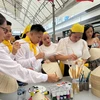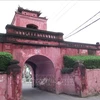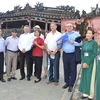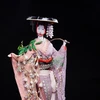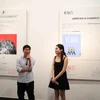The Keo Pagoda in Duy Nhat commune, Vu Thu district, in northern Thai Binh province, has been recognised as a special national relic for its unique historical, cultural, architectural and artistic values.
The province held a ceremony on October 24 to receive the title and officially open the 2012 Keo Pagoda Autumn Festival.
After the first ceremonies, the delegates, along with many Buddhist monks, nuns, followers and tourists, offered incense in commemoration of Buddhist monk Duong Khong Lo and those who took part in the pagoda construction, from the 17 th century.
Speaking at the ceremony, a senior official from the Ministry of Culture, Sports and Tourism underlined the unique values of the pagoda and urged Thai Binh province to preserve and promote these values so that it is worthy of becoming one of the nation’s special cultural heritages.
Just over 130 km away from the capital Hanoi, Keo Pagoda, which was built in 1632, is an ancient building but has 102 rooms, more than any other pagoda in Vietnam.
There are two passages which separate the pagoda from the temple. They are designed with curved roofs that join together at the 11.5m-high iron and wood bell tower.
The tower has three storeys, each of which possesses its own tiled roof and bronze bell.
The 108,000 m2 pagoda is home to a wealth of ancient artefacts, which range from intricately engraved wooden dragons to a collection of over 100 statues.
It has also preserved many valuable antiques, such as a pair of candlesticks from the Mac Dynasty, pottery and altars from the Le Dynasty and several imperial boats.
The Keo Pagoda Autumn Festival is held annually from the 13 th to 15 th of the ninth lunar month, in honour of monk Duong Khong Lo, who is said to have cured King Le Thanh Tong of illness.
In addition to the traditional religious rituals that commemorate the Buddhist monk, the festival also hosts a variety of cultural activities that reflect the lifestyle of the Red River Delta’s agricultural communities./.
The province held a ceremony on October 24 to receive the title and officially open the 2012 Keo Pagoda Autumn Festival.
After the first ceremonies, the delegates, along with many Buddhist monks, nuns, followers and tourists, offered incense in commemoration of Buddhist monk Duong Khong Lo and those who took part in the pagoda construction, from the 17 th century.
Speaking at the ceremony, a senior official from the Ministry of Culture, Sports and Tourism underlined the unique values of the pagoda and urged Thai Binh province to preserve and promote these values so that it is worthy of becoming one of the nation’s special cultural heritages.
Just over 130 km away from the capital Hanoi, Keo Pagoda, which was built in 1632, is an ancient building but has 102 rooms, more than any other pagoda in Vietnam.
There are two passages which separate the pagoda from the temple. They are designed with curved roofs that join together at the 11.5m-high iron and wood bell tower.
The tower has three storeys, each of which possesses its own tiled roof and bronze bell.
The 108,000 m2 pagoda is home to a wealth of ancient artefacts, which range from intricately engraved wooden dragons to a collection of over 100 statues.
It has also preserved many valuable antiques, such as a pair of candlesticks from the Mac Dynasty, pottery and altars from the Le Dynasty and several imperial boats.
The Keo Pagoda Autumn Festival is held annually from the 13 th to 15 th of the ninth lunar month, in honour of monk Duong Khong Lo, who is said to have cured King Le Thanh Tong of illness.
In addition to the traditional religious rituals that commemorate the Buddhist monk, the festival also hosts a variety of cultural activities that reflect the lifestyle of the Red River Delta’s agricultural communities./.





